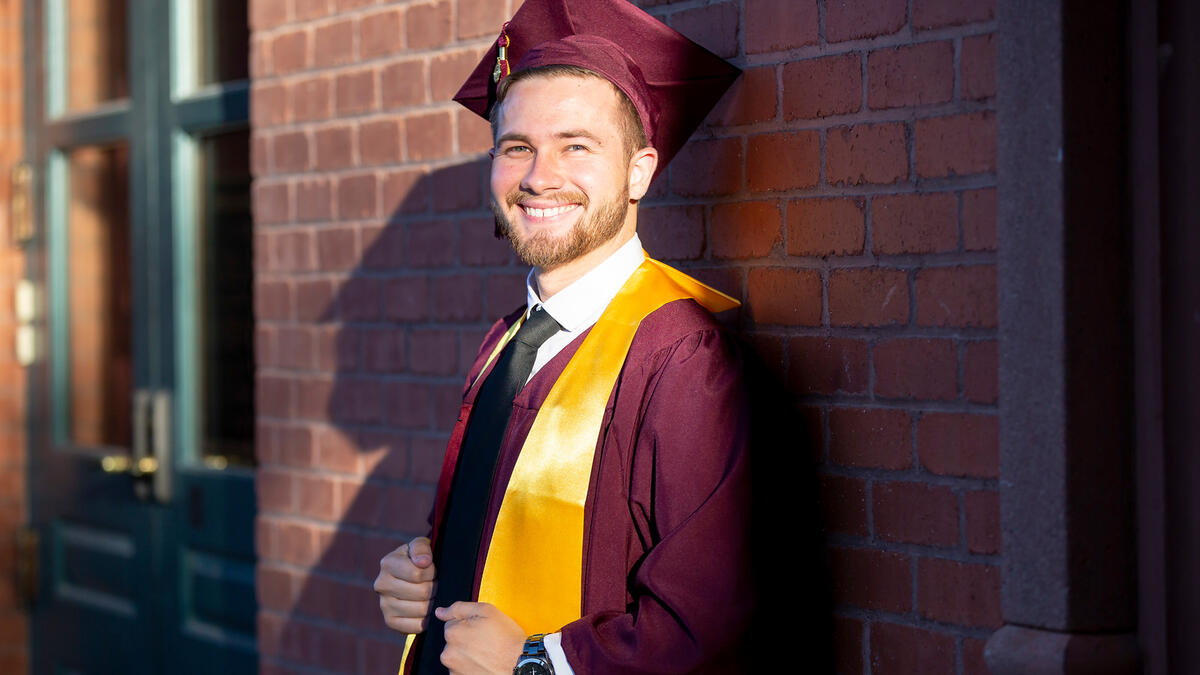Grad combined chemical engineering with Arabic studies

Chemical engineering student Yusef Sabri graduated this month with a minor and certificate in Arabic, as well. Photo courtesy of Yusef Sabri
Editor’s note: This is part of a series of profiles for spring 2019 commencement.
When you’re applying for a job after graduation, what sets you apart in a field of worthy contenders?
For Yusef Sabri, it’s the minor and certificate in Arabic studies that he picked up while earning a bachelor’s degree in chemical engineering. Sabri, who graduated this month, said his knowledge of Arabic has “opened up several doors.” He has already received multiple job offers.
The attractiveness of a job applicant with foreign language skills extends past just their knowledge of the language, Sabri said.
“You’re showing employers you’re good at whatever discipline you’re studying and that you speak another language,” Sabri said. “But you’re also showing them that you’re good at working with people of different backgrounds and different cultures, and that you’re more of a culturally and globally exposed individual.”
He credits the Fulton Schools of Engineering Career Center with helping him look for jobs, polish his resume and practice interviews. Where most students would go in for one or two mock interviews, Sabri said he completed at least a dozen.
“Most of my time that I spent at ASU, surprisingly, has been at the career center,” Sabri said. “I’ve been pretty successful at getting interviews and getting job offers because of the career center at ASU, I would say. … In the long run, I want to find a job that I can use both my engineering skills and also language skills.”
As part of his chemical engineering studies, Sabri worked on projects for NASA and the AZ Water Association. He was also involved with the American Institute of Chemical Engineers.
The culminating experience of his Arabic studies was an internship this semester — an opportunity his mentor, Souad Ali, recommended he pursue after he took several classes that she taught. Sabri chose to complete his internship with A Foreign Language Service, a Mesa-based company. He worked in their office a few hours every week doing technical tasks, but also went out on what was called “interpreting assignments.”
“Being an engineering student and also learning Arabic, I was able to use both,” Sabri said.
He interpreted for clients in medical and legal settings. Of the two, he said medical situations were less stressful “because you don’t have a judge and a jury and a whole courtroom looking at you.”
Ali, the head of Classics and Middle Eastern Studies for the School of International Letters and Cultures, said Sabri was a strong candidate for the internship whose knowledge of Arabic — and particularly his translation and interpretation skills — expanded with every class he took.
"He has done an outstanding job and we are very proud of his achievement as part of a long line of our students' and Arabic graduates' success stories through the years," Ali said.
Sabri said interpreting offers him a practical way to use the language skills he worked hard to master in his courses.
“I like that I’m actually able to apply what I learned in class and actually use it to help people that really need to understand what the other side is saying,” he said. “It makes me happy to be able to sit there and help both parties understand each other.”
More Science and technology

ASU postdoctoral researcher leads initiative to support graduate student mental health
Olivia Davis had firsthand experience with anxiety and OCD before she entered grad school. Then, during the pandemic and as a…

ASU graduate student researching interplay between family dynamics, ADHD
The symptoms of attention deficit hyperactivity disorder (ADHD) — which include daydreaming, making careless mistakes or taking…

Will this antibiotic work? ASU scientists develop rapid bacterial tests
Bacteria multiply at an astonishing rate, sometimes doubling in number in under four minutes. Imagine a doctor faced with a…